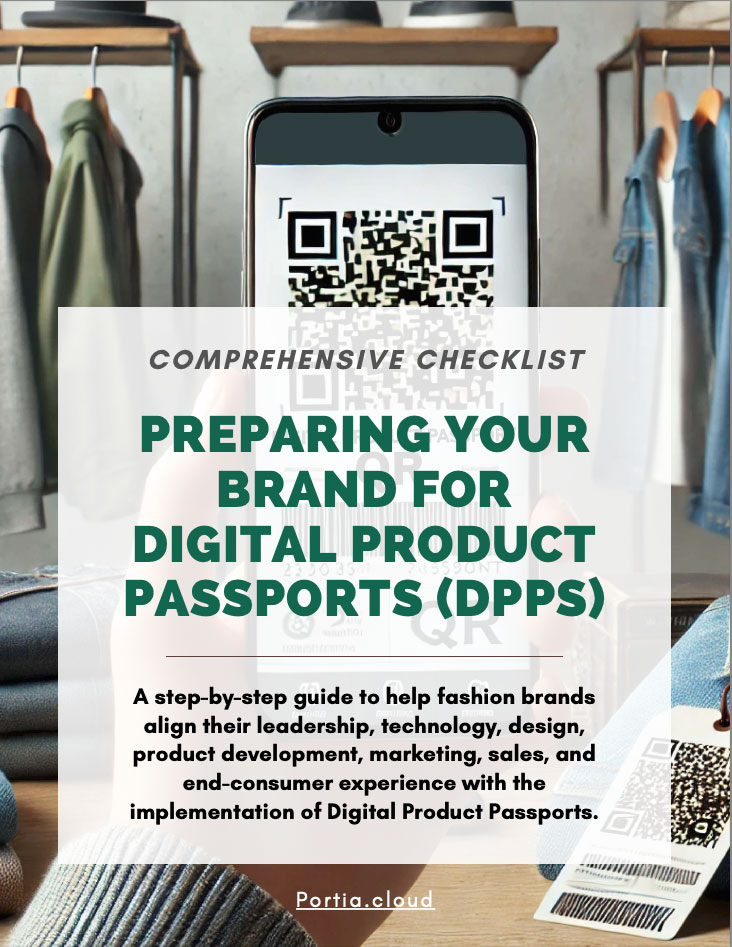Implementing Digital Product Passports can feel like a daunting task for fashion brands, but with the right tech solution, it can be seamless, efficient, and transformative. At Portia, we’ve designed a DPP solution that simplifies the process while meeting all key requirements for compliance, transparency, and scalability. Here’s what the ideal DPP tech solution should include:
1. Comprehensive Data Integration
- What It Needs: The ability to collect, organize, and integrate data from multiple sources, including suppliers, manufacturers, and internal systems.
- Why It Matters: Brands need a single platform that pulls information into one place, eliminating manual data collection.
- Stat: 72% of brands cite data fragmentation as a key challenge in implementing sustainability initiatives.
2. Scalability and Flexibility
- What It Needs: A system that works for brands of all sizes and can scale as they grow.
- Why It Matters: Whether you’re piloting DPPs for one product line or rolling them out across thousands, your solution should grow with you.
3. User-Friendly Interface
- What It Needs: Intuitive dashboards and tools for brands and suppliers to input, track, and analyze product data.
- Why It Matters: A complex system will deter adoption. Simplicity ensures your teams can implement DPPs effortlessly.
4. Unique Product Identifiers
- What It Needs: The ability to assign unique identifiers, like a QR code, to each product.
- Why It Matters: These tags make it easy for consumers to access product information and for brands to track items through the supply chain.
5. Real-Time Data Updates
- What It Needs: Instant updates across the supply chain whenever product data changes.
- Why It Matters: Ensures accurate, up-to-date information for regulatory compliance and consumer transparency.
6. Regulatory Compliance Tools
- What It Needs: Built-in frameworks to ensure compliance with global regulations, like the EU’s Ecodesign for Sustainable Products Regulation.
- Why It Matters: Non-compliance can lead to hefty fines and loss of market access.
7. Circular Economy Integration
- What It Needs: Features that support resale, repair, and recycling, such as solutions that allow your end-consumers to resell your products – on your website, smoothly and quickly with a few clicks of a button.
- Why It Matters: DPPs are essential for brands looking to embrace circular economy principles. Keep the customers in your world while growing your revenue from selling your products multiple times.
8. Supplier Collaboration Features
- What It Needs: Tools for suppliers to input data securely and easily, ensuring transparency across the value chain.
- Why It Matters: Supply chain transparency is critical for building trust and meeting regulatory requirements.
9. Data Security and Privacy
- What It Needs: Strong encryption and GDPR compliance to protect sensitive product and customer data.
- Why It Matters: Brands can’t afford to risk data breaches or non-compliance with privacy laws.
11. End-Consumer direct communication
- What It Needs: A solution to allow brands to communicate directly with their customers.
- Why It Matters: Have direct contact and communication with your end-consumers through the DPP. Get feedback to improve your collections and products and build a strong brand with loyal, returning customers.
12. Affordability and control
- What It Is: A cost-effective solution for managing Digital Product Passports with ease, without expensive add-ons or implementation projects.
- Why It Matters: Implement DPPs affordably, and with full control without being locked-in or losing your website traffic.
Why Portia.cloud?
At Portia.cloud, our DPP solution checks all these boxes and more. We understand the challenges brands face in implementing DPPs, and our platform is designed to simplify the process while ensuring compliance, boosting transparency, and driving operational efficiency.
Is your brand ready to embrace DPPs effortlessly? Let’s make it happen with Portia.



